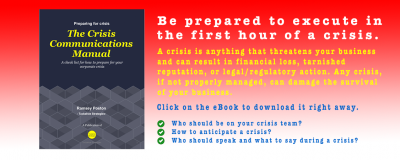Part two in a three-part series focusing on communications challenges for brands, advocacy organizations, and educational institutions during the Trump Administration.
The only certainty of a Trump Administration is uncertainty. During the Republican primary campaign, one of Donald Trump’s opponents characterized him as the “chaos candidate.” Those who cannot become adept at functioning amidst chaos will be penalized during a Trump Administration.
During the presidential campaign, Donald Trump railed against the establishment and policies he vowed to radically change. Immigration – build a wall. Abortion – punish women. Climate change – a hoax. Affordable Care Act – repeal it. Trade agreements – renegotiate.
Many advocacy organizations rely on federal funding that Trump and the Republican controlled congress can affect. For liberal organizations, such as those, which promote reproductive rights, environmental stewardship, and fair and humane immigration policies, it is critical to be on alert as these are areas about which candidate Trump was very vocal.
Following Trump’s stunning Election Day victory, DC’s advocacy organizations quickly huddled among themselves to figure out what a Trump Administration means to their causes. Many groups are scrambling to understand the new world order. Meanwhile, some leaders emerged with a brave face. Some privately rationalized that it would be “okay” and that Trump would moderate his stances.
Then Trump began announcing his cabinet picks. One-by-one the news hit harder and harder for defenders of key social issues. Moderation simply is not a word associated with Trump. His cabinet picks doubled-down on his campaign rhetoric.
Senator Jeff Sessions – Attorney General – is a conservative U.S. Senator from Alabama. Sessions has pledged to overhaul immigration. He was previously denied confirmation for a federal judgeship in 1986 – by a Republican-led Senate – because of racially charged comments he made.
Tom Price – Secretary, Health and Human Services – is a republican member of congress from Georgia and a surgeon who has led opposition to the Affordable Care Act. He wants to repeal the law and replace it with a plan that favors private health insurance companies. He introduced legislation that would deny government funding to health care plans that cover abortion. He is also in favor of privatizing Medicare.
Betsy DeVos – Secretary, Education – is a billionaire education activist who is a staunch proponent of vouchers under the “school choice” slogan. The idea diverts tens of millions of federal dollars to private schools.
Scott Pruitt – Administrator, Environmental Protection Agency – Oklahoma’s attorney general and staunch opponent of EPA’s major initiatives such as the Clean Power Plan and the Clean Air Act.
Organizations are now forced to pivot from “promoting change and moving forward” to a considerably more defensive position of “defending the status quo.” For many advocacy organizations, there is still so much progress to be made but that must now be put on hold. Success should now be based on not losing ground.
Defending ground is not as appealing as moving forward, but make no mistake, a Trump Administration will usher in sweeping changes. Women could be denied medical procedures like abortion; our working immigrant population could be decimated; public education could be gutted; and, health care could be placed back in the hands of the insurance companies and private markets.
The negative outcomes of these dramatic policy shifts could include: an increase in suicides and imprisonments in the case of abortion rights; a loss of production in valuable sectors such as construction, food production, hospitality, as a result of immigration reform; implosion of the public education system as we know it; and, a return to uncared for patients, unaffordable medical procedures, and soaring costs to individuals if the health care law is repealed.
The “stand-and-fight” positioning is the only logical approach. In light of the prevailing policy headwinds, advocacy leaders must now reconsider plans to advance their agendas. Now is the time to dig in and protect the progress that has been made over recent years. The goal now must be to defend the land you have.
This shift requires a strategic communications approach that must accomplish three things: first, advocacy groups must remind their members and donor bases of their successes accomplished over time; second, the strategy should outline the realities and possible consequences that are possible as the result of the new administration; and, third, it will be critical to create a specific action plan that can be concisely and compellingly communicated to stakeholders.
It’s a mistake to simply use the Trump threat as a fundraising tool. Organizations should be prepared to empty the “rainy day fund” to get their message out. This includes, for example, a significant bump in online advertising; creation of meaningful events that attract major media coverage; and, elevation of media relations to ensure there exists a nationwide network of spokespeople that can effectively advance the message.
Conservative organizations, too, need to be on alert and proceed with caution as Trump has proven to be unpredictable, at best. Many of the issues cited above are traditionally associated with progressive groups however, conservative groups can be negatively affected by a rollback of current policies.
These shared interests presents the opportunity for coalitions of “strange bedfellows,” between progressive and conservative groups working together to defend the same ground. For example, not all business organizations traditionally associated with conservative values are excited about the prospect of a massive drop in the workforce that is likely with the approach to immigration reform that President-elect Trump has espoused. Similarly, many industries desperately need predictability in public policy. It’s difficult to enter into contracts and agreements that often span decades when you don’t know what the playing field will look like just four or eight years from now. Broad coalitions could be built on immigration, trade, climate change, and other issues that benefit both progressive and conservative organizations. The most effective coalitions are the ones that represent the broadest number of people.
Donald Trump will be inaugurated as President of the United States on January 20, 2017. Organizations that take a “wait and see” approach will be making a mistake. Now is the time to dig-in and take action to defend the progress that has been made.
Part three, will focus on how colleges and universities can managing campus unrest in the Trump world.
###







